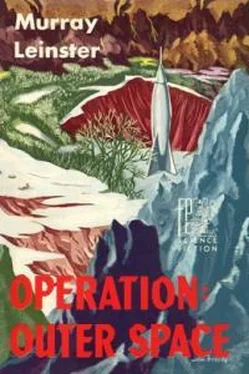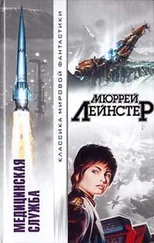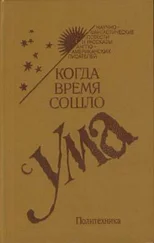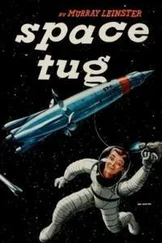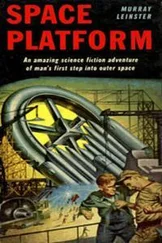For some obscure reason Cochrane felt ashamed. There was a long, a desperately long wait. Then sounds of machinery. The outer door closing. Small whistlings—compressed air.
The inner door opened. Bill Holden came out of the lock, his expression zestfully surprised.
"Hello, Jed! I tried the air. It's all right! At a guess, maybe a little high in oxygen. But it feels wonderfully good to breathe! And I can report that the trees are wood and the green is chlorophyll, and this is an Earth–type planet. That little smoky smell about is completely familiar—and I'm taking that as an analysis. I'm going to take a walk."
Cochrane found himself watching Babs' face. She looked enormously relieved, but even Cochrane—who was looking for something of the sort without realizing it—could not read anything but relief in her expression. She did not, for example, look admiring.
"I'll borrow one of Johnny Simms' guns," said Holden, "and take a look around. It's either perfectly safe or we're all dead anyhow. Frankly, I think it's safe. It feels right outside, Jed! It honestly feels right!"
"I'll come with you," said Cochrane, "Jones and the pilot are necessary if the ship's to get back to Earth. But we're expendable."
He went back to the control–room. Johnny Simms zestfully undertook to outfit them with arms. He made no proposal to accompany them. In twenty minutes or so, Cochrane and Holden went into the airlock and the door closed. A light came on automatically, precisely like the light in an electric refrigerator. Cochrane found his lips twitching a little as the analogy came to him. Seconds later the outer door opened, and they gazed down among the branches of tall trees. Cochrane winced. There was no railing and the height bothered him. But Holden swung out the sling. He and Cochrane descended, dangling, down fifty feet of unscarred, shining, metal hull.
The ground was still hot underfoot. Holden cast off the sling and moved toward cooler territory with an undignified haste. Cochrane followed him.
The smells were absolutely commonplace. Scorched wood. Smokiness. There were noises. Occasional cracklings from burned tree–trunks not wholly consumed. High–pitched, shrill musical notes. And in and among the smells there was an astonishing freshness in the feel of the air. Cochrane was especially apt to notice it because he had lived in a city back on Earth, and had spent four days in the moon–rocket, and then had breathed the Lunar City air for eighteen days more and had just come from the space–ship whose air was distinctly of the canned variety.
He did not notice the noise of the sling again in motion behind him. He was all eyes and ears and acute awareness of the completely strange environment. He was the more conscious of a general strangeness because he was so completely an urban product. Yet he and Holden were vastly less aware of the real strangeness about them than men of previous generations would have been. They did not notice the oddity of croaking sounds, like frogs, coming from the tree–tops. When they had threaded their way among leaning charred poles and came to green stuff underfoot and merely toasted foliage all around, Cochrane heard a sweet, high–pitched trilling which came from a half–inch hole in the ground. But he was not astonished by the place from which the trilling came. He was astonished at the sound itself.
There was a cry behind them.
"Mr. Cochrane! Doctor Holden!"
They swung about. And there was Babs on the ground, just disentangling herself from the sling. She had followed them out, after waiting until they had left the airlock and could not protest.
Cochrane swore to himself. But when Babs joined them breathlessly, after a hopping run over the hot ground, he said only:
"Fancy meeting you here!"
" I—I couldn't resist it ," said Babs in breathless apology. "And you do have guns. It's safe enough—oh, look!"
She stared at a bush which was covered with pale purple flowers. Small creatures hovered in the air about it. She approached it and exclaimed again at the sweetness of its scent. Cochrane and Holden joined her in admiration.
In a sense they were foolishly unwary. This was completely strange territory. It could have contained anything. Earlier explorers would have approached every bush with caution and moved over every hilltop with suspicion, anticipating deadly creatures, unparalleled monsters, and exotic and peculiar circumstances designed to entrap the unprepared. Earlier explorers, of course, would probably have had advice from famous men to prepare them for all possible danger.
But this was a valley between snow–clad mountains. The river that ran down its length was fed by glaciers. This was a temperate climate. The trees were either coniferous or something similar, and the vegetation grew well but not with the frenzy of a tropic region. There were fruits here and there. Later, to be sure, they would prove to be mostly astringent and unpalatable. They were broad–leafed, low–growing plants which would eventually turn out to be possessed of soft–fleshed roots which were almost unanimously useless for human purposes. There were even some plants with thorns and spines upon them. But they encountered no danger.
By and large, wild animals everywhere are ferocious only when desperate. No natural setting can permanently be so deadly that human being will be attacked immediately they appear. An area in which peril is continuous is one in which there is so much killing that there is no food–supply left to maintain its predators. On the whole, there is simply a limit to how dangerous any place can be. Dangerous beasts have to be relatively rare, or they will not have enough to eat, when they will thin out until they are relatively rare and do have enough to eat.
So the three explorers moved safely, though their boldness was that of ignorance, below gigantic trees nearly as tall as the space–ship standing on end. They saw a small furry biped, some twelve inches tall, which waddled insanely in the exact line of their progress and with no apparent hope of outdistancing them. They saw a gauzy creature with incredibly spindly legs. It flew from one tree–trunk to another, clinging to rough bark on each in turn. Once they came upon a small animal which looked at them with enormous, panic–stricken blue eyes and then fled with a sinuous gait on legs so short that they seemed mere flippers. It dived into a hole and vanished.
But they came out to clear space. They could look for miles and miles. There was a savannah of rolling soil which gradually sloped down to a swift–running river. The grass—if it was grass—was quite green, but it had multitudes of tiny rose–colored flowers down the central rib of each leaf. Nearby it seemed the color of Earth–grass, but it faded imperceptibly into an incredible old–rose tint in the distance. The mountain–scarps on either side of the valley were sheer and tall. There was a great stony spur reaching out above the lowland, and there was forest at its top and bare brown stone dropping two thousand feet sheer. And up the valley, where it narrowed, a waterfall leaped out from the cliff and dropped hundreds of feet in an arc of purest white, until it was lost to view behind tree–tops.
They looked. They stared. Cochrane was a television producer, and Holden was a psychiatrist, and Babs was a highly efficient secretary. They did not make scientific observations. The ecological system of the valley escaped their notice. They weren't qualified to observe that the flying things around seemed mostly to be furry instead of feathered, and that insects seemed few and huge and fragile,—and they did not notice that most of the plants appeared to be deciduous, so indicating that this planet had pronounced seasons. But Holden said:
Читать дальше
